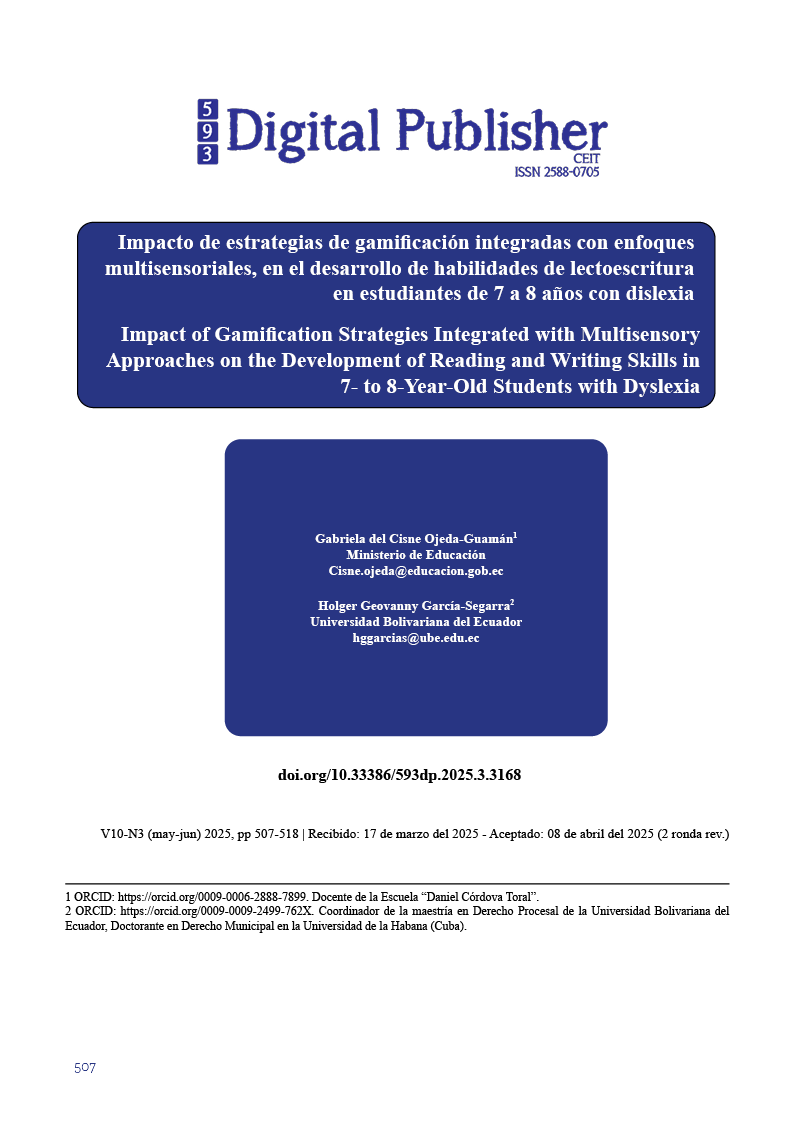Impact of Gamification Strategies Integrated with Multisensory Approaches on the Development of Reading and Writing Skills in 7- to 8-Year-Old Students with Dyslexia
Main Article Content
Abstract
This research aims to analyze the violation of the principle of procedural celerity in the administrative and judicial phases of the adoption process in Ecuador, specifically in the province of Imbabura, canton of Ibarra, by proposing a strategic framework based on the “Adoption Hug” program for a potential regulatory reform of the Code of Children and Adolescents. A mixed-method approach was employed, combining qualitative analysis to identify legal, social, and procedural factors contributing to delays, and a quantitative approach to measure their impact on the process. A non-experimental cross-sectional design was used, observing the problem without manipulating variables during the 2023-2024 period. The study adopted a descriptive-explanatory-propositional scope, allowing for the characterization of the current situation, the determination of delay causes, and the proposal of regulatory improvements to optimize the efficiency of the adoption process. Theoretically, methods of analysis, induction, deduction, and lege ferenda were applied, while at the empirical level, scientific observation, document review, interviews, surveys, and statistical analysis were utilized. The results show that adoption delays violate the guarantee of the child's best interests. Therefore, strengthening the existing legal framework is essential to ensure the promptness and effectiveness of these processes.
Downloads
Article Details

This work is licensed under a Creative Commons Attribution-NonCommercial-ShareAlike 4.0 International License.
1. Derechos de autor
Las obras que se publican en 593 Digital Publisher CEIT están sujetas a los siguientes términos:
1.1. 593 Digital Publisher CEIT, conserva los derechos patrimoniales (copyright) de las obras publicadas, favorece y permite la reutilización de las mismas bajo la licencia Licencia Creative Commons 4.0 de Reconocimiento-NoComercial-CompartirIgual 4.0, por lo cual se pueden copiar, usar, difundir, transmitir y exponer públicamente, siempre que:
1.1.a. Se cite la autoría y fuente original de su publicación (revista, editorial, URL).
1.1.b. No se usen para fines comerciales u onerosos.
1.1.c. Se mencione la existencia y especificaciones de esta licencia de uso.
References
Asociación Americana de Psiquiatría. (2014). Manual diagnóstico y estadístico de los trastornos mentales (5.ª ed., DSM-5; A. M. Eguiluz Román, Trad.). Editorial Médica Panamericana. https://doi.org/10.1176/appi.books.9780890425596.
Coltheart, M., Rastle, K., Perry, C., Langdon, R., & Ziegler, J. (2001). DRC: A dual route cascaded model of visual word recognition and reading aloud. Psychological Review, 108(1), 204–256. https://psycnet.apa.org/doi/10.1037/0033-295X.108.1.204
Deterding, S., Dixon, D., Khaled, R., & Nacke, L. (2011). From game design elements to gamefulness: Defining ‘gamification’. In Proceedings of the 15th International Academic MindTrek Conference (pp. 9–15). ACM. http://dx.doi.org/10.1145/2181037.2181040
Fernández, S., & Rojas, L. (2023). Gamificación y aprendizaje: Impacto en la motivación de estudiantes con dislexia. Revista de Educación y Tecnología, 12(2), 45-60. https://revistaeducacionytecnologia.org/
García, L., & Pérez, J. (2021). Estrategias multisensoriales para la dislexia en educación básica. Editorial Universitaria. https://editorialuniversitaria.uchile.cl
Jiménez, R., & Guzmán, C. (2022). Procesamiento fonológico y dificultades lectoras en niños con dislexia. Revista de Psicopedagogía, 40(2), 120-135. https://revistadepsicopedagogia.org/
Hernández-Sampieri, R., Fernández-Collado, C., & Baptista, L. P. (2022). Metodología de la investigación (7.ª ed.). McGraw-Hill. https://pdfs.semanticscholar.org/f6bf/7901dcceae8e87c5760eb13ff6ef5ff3f072.pdf
López, R., & Díaz, M. (2022). Retos en la aplicación de la gamificación en educación básica: Recursos y formación docente. Investigación Educativa, 35(3), 180-195. https://revistaeducacionytecnologia.org/
López, R., & Ramírez, S. (2021). Gamificación en el aula: Mejorando la motivación en estudiantes con dislexia. Educación y Tecnología, 9(1), 33-47. https://revistaeducacionytecnologia.org/
Lyon, G. R., Shaywitz, S. E., & Shaywitz, B. A. (2003). A definition of dyslexia. Annals of Dyslexia, 53(1), 1–14. https://link.springer.com/article/10.1007/s11881-003-0001-9
Martínez, P., & Herrera, M. (2021). Impacto emocional de la dislexia en niños y adolescentes. Psicología Educativa, 38(1), 50-65. https://revistapsicologiaeducativa.org/
Martínez, P., Gómez, T., & Hernández, F. (2020). Programas de intervención temprana para la dislexia: Resultados y perspectivas. Psicología Educativa, 26(4), 123-137. https://revistapsicologiaeducativa.org/
Mendoza, S., & Suárez, D. (2023). Interacción social y aprendizaje en estudiantes con dificultades lectoras. Pedagogía y Sociedad, 29(4), 215-230. https://revistapedagogiaysociedad.org/
Ministerio de Educación de la Nación. (2019). Educación inclusiva: fundamentos y prácticas para la inclusión. http://www.bnm.me.gov.ar/giga1/documentos/EL006577.pdf
Ritchey, K. D., & Goeke, J. L. (2006). Orton-Gillingham and Orton-Gillingham-based reading instruction: A review of the literature. The Journal of Special Education, 40(3), 171–183. https://journals.sagepub.com/doi/10.1177/00224669060400030501
Sánchez, F., & Medina, T. (2022). Uso de herramientas visuales para mejorar la comprensión lectora en niños con dislexia. Revista de Educación Especial, 15(1), 98-113. https://revistaeducacionespecial.org/
Sanmugam, M. (2020). Enhancing reading skills through gamification for children with learning disabilities. International Journal of Academic Research in Progressive Education and Development, 9(2), 167–180. http://dx.doi.org/10.6007/IJARBSS/v12-i12/15605
Smith, J., Johnson, A., & Lee, K. (2022). Implementación del método Orton-Gillingham en educación primaria: Un enfoque multisensorial para la dislexia. Journal of Educational Strategies, 15(2), 78-92. https://journalofeducationalstrategies.com/
Torres, A., & Ramírez, L. (2022). Gamificación y atención en el aprendizaje de la lectura. Investigación Educativa, 35(3), 180-195. https://revistainvestigacioneducativa.org/
Vargas, R., & Ortega, M. (2023). Escritura asistida y autonomía en niños con dificultades lectoras. Psicología y Educación, 21(2), 140-158. https://www.revistadepsicologiayeducacion.es/
Vygotsky, L. S. (1978). Mind in society: The development of higher psychological processes. Harvard University Press. https://doi.org/10.2307/j.ctvjf9vz4



